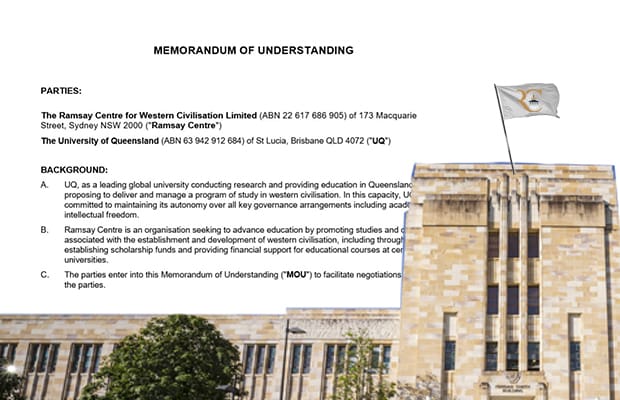As of today, the University of Queensland (UQ) has signed a Memorandum of Understanding (MOU) with the Ramsay Centre for Western Civilisation to launch a major in Western Civilisation in 2020. The deal grants the Ramsay Centre seats on the selection committee for staff and students of the program.
30 students each year will receive scholarships funded by the Ramsay Centre, and will take either a Bachelor of Advanced Humanities (Honours) (Western Civilisation), or a Bachelor of Humanities (Western Civilisation) / Bachelor of Laws (Honours).
These students will be selected by the ‘Ramsay Scholarship Selection Panel,’ which will be chaired by a member of UQ senior management and will include either the Ramsay Centre’s CEO or Academic Executive Officer. The panel will also include the Executive Dean of Humanities and Social Sciences (HASS), Professor Heather Zwicker, who earlier this year bypassed the advisory HASS Academic Board to approve the program, even after the HASS Board rejected proposals for Ramsay curricula three times. The HASS Board only holds an advisory power at the University.
There are outstanding concerns that the curriculum is likely incompatible with UQ’s commitments to reconciliation with First Nations peoples. The fact that HASS Board never approved the course curriculum eventually signed off by the Vice-Chancellor, Peter Høj, will likely present further concerns for many.
In the announcement of the MoU, UQ stated that they “acknowledge the historical fact that violent colonisation was undertaken by western countries that believed themselves to be ‘civilised’.”
The program will be taught by ten full-time equivalent academic staff. Notably, although UQ will have the final say in who these staff will be, UQ will invite either the Ramsay Centre’s CEO or Academic Executive Officer to be on the staff selection panel. Moreover, although current UQ staff may apply to teach the program, UQ has also committed to “recruiting, through an open and competitive process, at least 6 new staff.”
The involvement of the Ramsay Centre in the selection of the program’s staff and students comes as particularly worrying news.
As the Ramsay Centre has made bids to fund similar programs at other Australian universities — including the University of Wollongong, University of Sydney, and University of Western Australia — significant concern has been raised about how such funding might erode academic autonomy and university independence from partisan financial interest.
At UQ alone, there has been resounding backlash to the program’s introduction.
In May, over 500 students met in the first general meeting since 1971 to vote down the Ramsay Centre’s program.
A potential deal was also rejected by the National Tertiary Education Union and the student UQ Union.
Despite also rejecting the Ramsay Centre’s initial expression of interest in February, the UQ Academic Board, its largest advisory group for academic decisions, voted to endorse a deal between UQ and the Ramsay Centre. This blind vote, which Honi understands passed 44 votes in favor to 32, seemingly put the writing on the wall for the fight against the Ramsay Centre, giving their blessing to the UQ Chancellor and Vice-Chancellor to sign an MoU a month later.
In December 2018, the University of Wollongong (UoW) also signed a Memorandum of Understanding with the Ramsay Centre bringing the program to Wollongong. Only yesterday, a funding agreement was signed. Unlike UQ, however, the UoW Academic Board voted against fast-tracking a 2020 Ramsay program, voting 28 to 16.
The status of negotiations between the Ramsay Centre and the University of Sydney has remained largely unknown for most of 2019.
As the news breaks, significant student and staff backlash can be expected from tomorrow onwards.
More to come.





